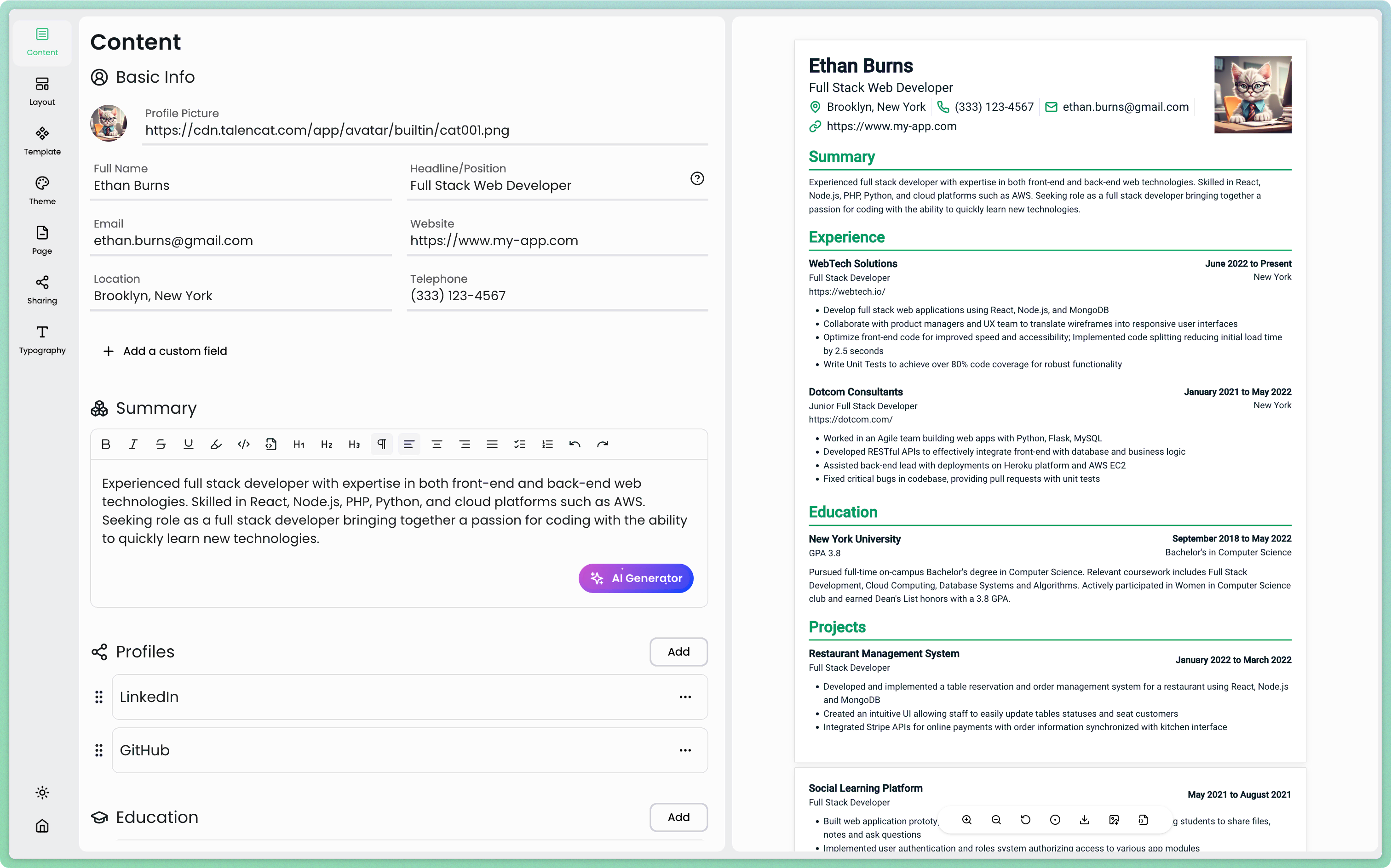If you want to become an AWS Data Engineer, how would you build your resume? In this article, we will first give you an overview of the AWS data engineer job, and tell you how to build a professional resume for being an AWS data engineer with a proven example.
Introduction of AWS Data Engineer
AWS Data Engineer is a professional role that involves working with various AWS services and tools to design, build, and maintain data pipelines, data warehouses, and data lakes for storing, processing, and analyzing large volumes of data.

Key Responsibilities and Roles of AWS Data Engineer
Some of the key responsibilities of an AWS Data Engineer include:
- Data Ingestion: Designing and implementing data ingestion pipelines to collect data from various sources (databases, APIs, streaming data, etc.) using services like AWS Kinesis, AWS Lambda, and AWS Glue.
- Data Storage: Setting up and managing data storage solutions like Amazon S3 (for object storage), Amazon EFS (for file storage), and Amazon RDS/Redshift (for relational and analytical databases).
- Data Processing: Building and maintaining data processing pipelines using services like AWS Glue, AWS Batch, and AWS EMR (for big data processing with Hadoop, Spark, etc.).
- Data Transformation: Transforming and cleaning raw data into structured and analysis-ready formats using tools like AWS Glue, AWS Lambda, and Apache Spark on EMR.
- Data Warehousing: Designing and implementing data warehouses (e.g., Amazon Redshift) for analytics and reporting purposes.
- Data Lakes: Building and managing data lakes (e.g., on Amazon S3) for storing and analyzing structured, semi-structured, and unstructured data.
- Data Cataloging: Creating and maintaining metadata and data catalogs (e.g., AWS Glue Data Catalog) for data discovery and governance.
- Data Security: Implementing data security measures, such as encryption, access control, and auditing, using AWS services like AWS KMS, AWS IAM, and AWS CloudTrail.
- Data Monitoring: Setting up monitoring and alerting systems for data pipelines and infrastructure using services like AWS CloudWatch, AWS Lambda, and Amazon SNS.
- Automation: Automating data engineering tasks and workflows using AWS services like AWS Step Functions, AWS Data Pipeline, and AWS Lambda.
AWS Data Engineers often work closely with other roles, such as Data Scientists, Data Analysts, and Software Engineers, to build and maintain robust and scalable data platforms on AWS.
AWS Data Engineer Certification
To be an AWS data engineer, it's better to have an "AWS Certified Data Engineer - Associate" certification. AWS Certified Data Engineer - Associate is an associate-level certification from AWS for data engineers.

To get this certification, you need to take an exam, the basic information about this exam is as follows:
- The exam duration is 130 minutes.
- The exam format consists of 65 questions, which can be either multiple-choice or multiple-response.
- The exam cost is $150 USD.
- The exam can be taken either in-person at a Pearson VUE testing center or as an online proctored exam.
- The exam is offered in English, Japanese, Korean, and Simplified Chinese.
The certification validates skills and knowledge in core AWS data services, data ingestion and transformation, data pipeline orchestration, programming concepts, data modeling, data life cycle management, and ensuring data quality. It appears to be targeted towards professionals working as data engineers on the AWS platform, demonstrating their proficiency in various data-related aspects, including data pipelines, data modeling, and data quality management using AWS services and tools.
For more information about this certification, you can check the following page out!

How to Write an AWS Data Engineer Resume
Writing an effective resume for an AWS Data Engineer role requires highlighting your relevant skills, experience, and achievements in data engineering and working with AWS services.

Here are some tips to help you create a strong AWS Data Engineer resume:
- Summary/Objective: Start with a concise summary or objective statement that highlights your expertise as an AWS Data Engineer, your years of experience, and your core competencies in data engineering, AWS services, and relevant technologies.
- Technical Skills: Create a dedicated section for your technical skills, listing your proficiency with AWS services like Amazon S3, Amazon Kinesis, AWS Glue, Amazon Athena, Amazon EMR, Amazon Redshift, and any other relevant data engineering tools and technologies you've worked with.
- Professional Experience: Describe your professional experience in reverse chronological order, focusing on your roles and responsibilities as an AWS Data Engineer or in related data engineering roles. Use bullet points to highlight your key achievements, such as:
- Designed and implemented scalable data ingestion pipelines using AWS services like Kinesis and Glue
- Built and maintained data lakes and data warehouses on Amazon S3 and Redshift
- Developed and deployed ETL/ELT processes for data transformation and cleaning
- Optimized data processing workflows using AWS services like EMR and Batch
- Implemented data security and governance measures using AWS KMS, IAM, and CloudTrail
- Monitored and optimized data pipeline performance using CloudWatch and other AWS monitoring tools
- Projects: If you have worked on any notable data engineering projects, especially those involving AWS services, include a dedicated section to describe them. Highlight the AWS services used, the challenges faced, and the results achieved.
- Certifications: If you hold any AWS certifications, such as the AWS Certified Data Analytics - Specialty (deprecated) or the new AWS Certified Data Engineer - Associate, list them in a separate section to demonstrate your expertise and commitment to AWS technologies.
- Education: Include your educational background, including any relevant degrees, certifications, or coursework in data engineering, computer science, or related fields.
- Keywords: Strategically incorporate relevant keywords throughout your resume, such as "AWS Data Engineer," "data pipelines," "data lakes," "data warehousing," and specific AWS service names, to help your resume get noticed by applicant tracking systems (ATS).
Remember to tailor your resume to the specific job requirements and highlight your most relevant skills and experiences. Quantify your achievements whenever possible, and use clear and concise language to showcase your expertise as an AWS Data Engineer.
Build Your AWS Data Engineer Resume With TalenCat
TalenCat CV Maker is an AI-powered resume editor that provides a wide variety of built-in resume modules to maximize the customization of your resume. With TalenCat CV Maker, you can build a professional resume for an AWS Data Engineer role with various content modules:
- Basic Information
- Self-Summary
- Profile
- Education Information
- Work Experience
- Project Experience
- Languages
- Awards
- Interests
- Volunteer Experience

Also, you can add a custom section to customize more unique content. In each section, you can even utilize generative AI to help you improve the efficiency and quality of content.
AWS Data Engineer Resume Example
Still, if you don't know how to start to build your AWS data engineer resume, here is a great example for you. You can mimic this proven example to create a professional resume for an AWS data engineer role with TalenCat CV Maker.
TalenCat
AWS Data Engineer
Summary
Experienced AWS Data Engineer with 5+ years of expertise in designing, building, and maintaining robust data pipelines and analytics solutions on the AWS cloud platform. Proficient in leveraging various AWS services to ingest, process, and analyze large volumes of structured and unstructured data. Skilled in implementing data security, governance, and monitoring practices.
Technical Skills
- AWS Services: Amazon S3, Amazon Kinesis, AWS Glue, Amazon Athena, Amazon EMR, Amazon Redshift, AWS Lambda, AWS CloudFormation, AWS CloudWatch
- Data Engineering Tools: Apache Spark, Apache Kafka, Apache Airflow, Python, SQL, Bash scripting
- Databases: PostgreSQL, MySQL, Amazon RDS, Amazon DynamoDB
- Data Modeling: Dimensional modeling, denormalization, star/snowflake schemas
- Data Visualization: Amazon QuickSight, Tableau, Power BI
Professional Experience
AWS Data Engineer (2020 - Present)
XYZ Corporation, New York, NY
- Designed and implemented scalable data ingestion pipelines using AWS services like Kinesis, Glue, and Lambda for real-time and batch data processing.
- Built and maintained a secure data lake on Amazon S3 for storing structured, semi-structured, and unstructured data from various sources.
- Developed and deployed ETL/ELT processes using AWS Glue and Apache Spark for data transformation and cleaning, ensuring data quality.
- Optimized data processing workflows by leveraging Amazon EMR clusters for distributed processing of large datasets using Apache Spark.
- Implemented data security measures, including encryption at rest and in transit, access control policies, and auditing using AWS KMS, IAM, and CloudTrail.
- Monitored and optimized data pipeline performance using AWS CloudWatch, enabling proactive identification and resolution of issues.
- Collaborated with data scientists and analysts to design and implement data models and data warehousing solutions on Amazon Redshift.
Certifications
- AWS Certified Data Engineer - Associate (2024)
- AWS Certified Developer - Associate (2020)
Education
Bachelor of Science in Computer Science
State University, New York, NY (2015 - 2019)Projects
E-commerce Data Pipeline (2022 - Present)
- Designed and implemented a scalable data pipeline for ingesting and processing e-commerce data from various sources using AWS services like Kinesis, Glue, and EMR.
- Developed ETL processes to transform and load data into a data warehouse on Amazon Redshift for advanced analytics and reporting.
- Implemented data quality checks and monitoring using AWS Lambda and CloudWatch to ensure data integrity and timely detection of issues.
Conclusion
In conclusion, becoming an AWS Data Engineer requires a combination of technical expertise, hands-on experience, and the ability to effectively communicate your qualifications through a well-crafted resume.
By following the tips outlined in this article, such as highlighting your proficiency in relevant AWS services, data engineering tools, and technologies, as well as quantifying your achievements in areas like data ingestion, processing, warehousing, and security, you can create a compelling resume that showcases your value as an AWS Data Engineer.
Additionally, obtaining the AWS Certified Data Engineer - Associate certification can further validate your skills and knowledge, making you a more competitive candidate in the job market. With the right approach and the help of tools like TalenCat CV Maker, you can craft a professional resume that stands out and increases your chances of landing your dream AWS Data Engineer role.
![[2024] AWS Data Engineer Resume Example + Writing Guide](https://images.unsplash.com/photo-1523474253046-8cd2748b5fd2?crop=entropy&cs=tinysrgb&fit=max&fm=jpg&ixid=M3wxMTc3M3wwfDF8c2VhcmNofDF8fGFtYXpvbnxlbnwwfHx8fDE3MTY0NTk2NjF8MA&ixlib=rb-4.0.3&q=80&w=2000)




